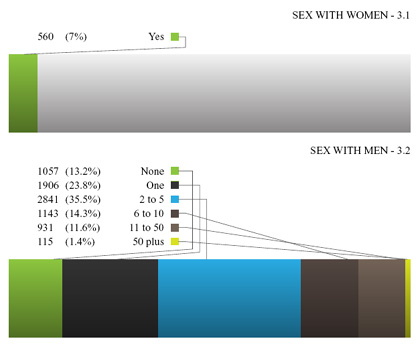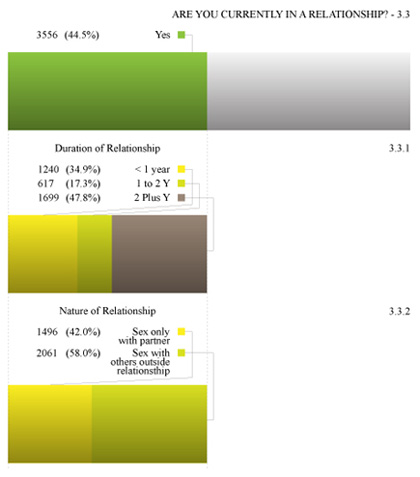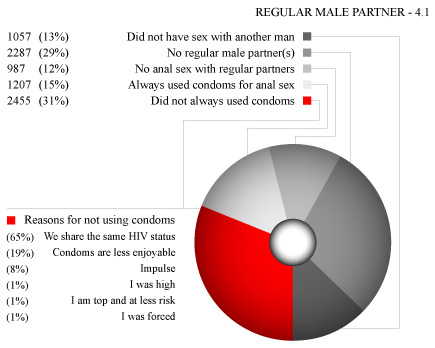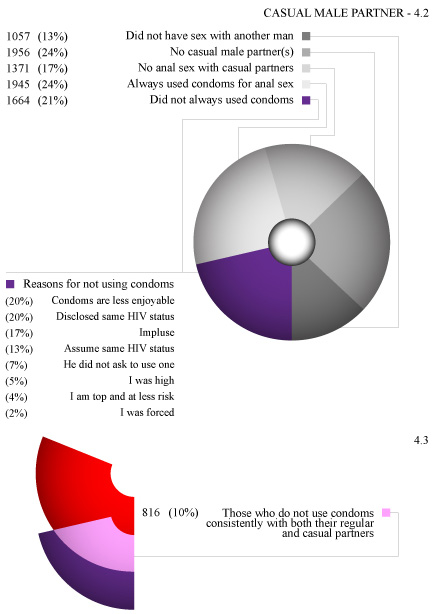Fridae.com 2009 MSM Sex Survey – Final Report

Methodology
In March and April 2009, an English language survey was conducted online (www.msmsexsurvey.com) and marketed through a network of community partners across Asia. 7993 MSM and TG completed the questionnaire about demographics, risk behaviour, HIV testing and acceptance. The questionnaire had over 140 questions, and took an average of 8 minutes to complete.
General demographics
The average age of respondents was 33 years (range 15-74). Most of the participants live in Singapore, Malaysia, USA, Australia, Hong Kong, Thailand and China. 5387 (67.4%) reported university education or higher.
Identity & socialisation
6558 (82%) of the respondents were gay-identified, and 1221 (15%) bisexual. 644 (8.1%) reported being uncomfortable with their sexuality, and 247 (3.1%) had no gay friends.
Sex & relationships during the past 6 months
560 (7%) had sex with a woman in the past 6 months. During this period, 1057 (13.2%) did not have any male sexual contact, 1906 (23.8%) had one partner, 2841 (35.5%) had 2 to 5 partners and 2189 (27.3%) had 6 or more partners.

3356 (44.5%) of the respondents are currently in a relationship. Of these, 1699 (48%) were for more than 2 years, and 1496 (42%) were sexually exclusive (sex only with one regular partner).

Sexual behaviour during the past 6 months
For male to male sex, the survey differentiated between regular (boyfriends and lovers), casual, and commercial sex partners. After excluding those who a) did not have any male sexual contact; b) did not have any male partners in the respective categories; c) did not have anal sex and; d) always used a condom for anal sex, it showed that 2455 (31%) of the respondents were not using condoms consistently with a regular male partner, and; 1664 (21%) were not using condoms consistently with their casual male partners. 816 (10%) did not use condoms consistently with both their regular and casual partners. 253 (3%) of respondents did not use condoms consistently with their commercial sex partners.


Unprotected anal sex amongst men in regular relationships is high
(2455 of 3556 in a current relationship do not use condoms consistently).
This is a cause for concern when either or both partners is also having
unprotected anal sex with casual partners (816 of 3556). This puts not
only themselves, but also their regular partners at risk.
The main reasons for regular partners to forego condom use was both partners share the same HIV status (positive or negative), and because they felt condoms made sex less enjoyable. For casual partners, 20% did not use condoms after disclosing their HIV status, 17% on impulse, 13% assumed the other person’s HIV status was the same as their own, and 7% because their partner did not ask to use one. Only 5% said being “high” was a reason for not using condoms.
Venues for meeting men
The Internet was the most common way for respondents to meet other men for sex (4936, 72%), followed by saunas (2615, 38%) and bars and clubs (1938, 28%).
Sexually transmitted infections, drugs & travel
3873 (48%) of respondents had an STI test in the past 6 months, and 1958 (24%) were diagnosed or treated for an STI during that period. 1050 (13%) reported consuming recreational drugs (e.g. Viagra, ecstasy, poppers, methamphetamines) for sex.
5121 (64%) of respondents travelled to a foreign country in the past 6 months, during which 2096 (41%) of them had protected anal sex and 506 (10%) had unprotected anal sex with a casual partner they met on their travels. 1098 (21%) attended a circuit or dance party.
HIV testing
2039 (26%) of respondents have never had an HIV test, with 4066 (51%) taking a test in the past 12 months. Of the 2039 who have never been tested, 46% reported a low personal risk assessment as the reason for not getting a test. Conversely, 14% felt it was likely they were already positive, and 30% either did not want to think about it, or were worried about confidentiality of the test results, and the stigma and discrimination they would face if tested positive. 9% did not know where they could go for a test.
Of the 5954 who have had an HIV test, 295 (5%) self-reported as HIV positive. Of these, 184 (62%) are currently on anti-retroviral treatment, and 150 (51%) have achieved an undetectable viral load. 135 (46%) of the positive MSM are currently in a relationship, 40 (30%) of which are with another HIV positive man.
Disclosure
Whilst 5177 (65%) of those surveyed felt that the best time to discuss one’s HIV status was before sex, only 1643 (21%) actually did so.
HIV acceptance
3109 (39%) of those surveyed personally knew someone who was HIV positive (friend, partner, co-worker, family member). Acceptance of HIV positive people was generally high, with most people willing to befriend, care for, and work with someone HIV positive. 2439 (31%) would also have sex with someone who had disclosed their positive status to them, and 1115 (14%) have already ever had sex with someone they knew was positive.
Conclusions
1. Not all MSM and TG are at equal risk for HIV infection. Men who abstain from sex, do not have anal sex, or use a condom consistently with all their sex partners when they have anal sex are at little to no risk of being infected with HIV.
2. Those most at immediate risk are the 21% of men who have unprotected sex with casual partners (1664 of 7993) and 3% with commercial partners (253 of 7993).
3. Unprotected anal sex amongst men in regular relationships is high (2455 of 3556 in a current relationship do not use condoms consistently). This is a cause for concern when either or both partners is also having unprotected anal sex with casual partners (816 of 3556). This puts not only themselves, but also their regular partners at risk.
4. Recent HIV testing (within the last 12 months) was also low, and almost a quarter of those surveyed had never been tested. A significant number who have never been tested, or tested recently continue to have unprotected anal sex with casual partners (684 of 7993).
5. The level of HIV acceptance in the community is relatively high, but despite this, the degree of HIV disclosure remains low.
Caveats
The respondents of this survey are not a representative sample of the gay community. Risk behaviour varies widely between countries and demographic segments and needs further study.
To view or download the 2009 MSM Sex Survey report (in PDF), click onto http://www.msmsexsurvey.com.











 Printable Version
Printable Version











Reader's Comments
I heard they say even you're not having sex with other's guy but still will be infected....am I right?
Let me rephrase your question: "Is there any risk if one has sex with only one committed partner very often? I heard that it is still possible to get infected even if one doesn't have many sex partners. Is this correct?"
The answer:
1) Two HIV-negative persons can never infect each other by having sex with each other very often. HIV can only be transmitted from a HIV-positive source: HIV-positive sex partner; blood transfusion with blood from HIV-positive person (very low risk because blood banks in Singapore regularly screen their blood for HIV); HIV-positive person who shares syringes with you; or HIV-positive mother.
2) The reasons why you STILL must practice protected sex with your BF (committed partner) consistently are:
a) Even he may not know he is HIV-positive if he has never taken any test;
b) Even he may not know he is HIV-positive if he had taken a test recently which didn't reveal his HIV status because the infection took place during the window period (up to 6 months after infection). For example, if he had been infected with HIV but then took a test just 1 week (or up to 6 months) after that infection, the test may still not be able to detect his infection because insufficient antibodies had been made inside his body for the test to detect them;
c) He might be HIV-positive and lied to you that he is not. If he did that, it's very hard to tell because if he has been taking medication regularly, it is possible that ordinary tests cannot detect his HIV status because his viral load is kept very low. So, even if he shows you a negative HIV test result, you still cannot rule out the possibility that he is HIV-positive and that it it completely safe to practice unprotected sex with him. The only thing that you can conclude is that he is either HIV-negative or HIV-positive but with a low viral load. If the case is the latter, it just means that your chance of getting HIV infection by practicing unprotected sex with him is lower. But it's still possible to become infected.
d) Even if he was really not lying and was HIV-negative when you got attached to him, it is still possible that he may fool around later without your knowledge. You can't watch over him 24/7, can you?
In short, you should always practice protected anal and oral sex consistently with anyone, including your committed partner, because it has all the advantages and ZERO disadvantages. Unprotected sex doesn't make sex more enjoyable. It just makes it more messy if nothing else. It has zero value in building trust or romance. If your love and trust are strong, they can't be torn by a piece of film. So, always practice protected oral and anal sex with anyone and everyone you have sex with, always. There are more intelligent ways to show you love or trust someone. Practicing unprotected sex is the stupidest way.
First, let me draw your attention to an earlier article on Fridae entitled "US gay men mostly getting HIV from main partners" [http://www.fridae.com/newsfeatures/2009/06/01/8374.us-gay-men-mostly-getting-hiv-from-main-partners]. To quote the executive summary, "Using data from the National HIV Behavioral Surveillance System (NHBS) involving gay men in five large US cities, researchers found that over 50% of HIV transmissions in US gay men are from main sexual partners and 46% of infections were from partners who were believed to be HIV-negative." This points to the fact that it's a myth that one could lower his guard if he has a committed partner. This delusion had been a major cause of new infections in the study. Why did the majority of infections come from the main partner? One of the conclusions in the article is " Men were more likely to report UNPROTECTED receptive anal sex with their main partner than a casual partner."
Second, selective practice of unprotected sex works against the psychological principle of automaticity. In simpler words, human beings tend to behave in a certain way by forming habit, so if you sometimes practice protected sex and sometimes not, then you confuse yourself. It's much easier to do something if you have formed a habit to behave in a certain way.
Thirdly, as I explained earlier, there is no value in unprotected sex. For straight couples, there is a procreation value. But for gay couples, you don't need to make your partner pregnant or vice versa. So why would you need to practice unprotected sex?
Excluding those two groups, you get 46.6% "sometimes did not use condoms with casual partners", compared to about 29% in Australia.
#13: Your analogy is not anywhere close to reality. In Singapore, statistically, you'd encounter one HIV-positive sex partner out of every 20 gays you have sex with. In Bangkok, it's around 1 in 4. I don't think travelling in a car or driving one is statistically as dangerous, anywhere in the world. A car driver or passenger in Singapore, Bangkok or anywhere else wouldn't encounter one serious/fatal accident out of every 4 or 20 trips he makes. The main difference between travelling in a car and having sex is that, in the former case, the driver/passenger is able to see his surroundings, but a person having sex can't see HIV in his sex partners at all.
A closer analogy would be the life-or-death roulette we often see in movies, in which a person inserts a bullet into one of the 6 chambers of a pistol, revolves the cylinder, points the pistol at his own head then pulls the trigger. His odd of being killed is 1 in 6. For those who seek casual sex partners in places where the prevalence of HIV-infection among MSM is higher than 1 in 6, their odd of hooking up a HIV-positive sex partner is statistically higher than the movie character I described being shot dead.
#14: Hi, I am glad you raised this question, and it's certainly not a lame question. It's always better to ask when one is in doubt. There are 2 ways to do this:
A) You use flavoured condoms. These are available in most 7-11 stores.
B) You use ordinary condoms plus flavoured lubricant. Such lubricant may be purchased in some pharmacies and shops that specialise in sex toys.
I believe this gives a more accurate picture of the gay community, many of whom are already being "safe" in their own way.
#14...protected oral sex is overkill (at least for HIV), it is very low risk, even with cum in mouth. And, if you can find a guy who use condom to get sucked, Id be amazed. Its just not done, no need.
And yes, like what he has indicated, oral sex should be done with a condom. Its the behaviour and mindset that needs changing. You will be laughed at if you ask anyone to wear a rubber on his dick long time ago but now, ppl understand the logic and most practice it. Like I said, its the mindset..
From a philosophical perspective, the fundamental questions to ask ourselves when we are deciding whether to use protection are:
1) how much risks are we exposed to if we do not protect ourselves;
2) how serious the risk is (e.g. is there any remedy?);
3) what is the price to pay to use the protection;
4) what kind of life do you want and how does the risks that you may be exposed to affect your ability to achieve it?
To answer Q1, the risk we are exposed to are determined by two main factors: i) Number of Exposure; ii) Per-exposure Risk. Hence,
Risk = Number of Exposure x Per-Exposure Risk.
Even a low-risk activity like unprotected oral sex can lead to a high Risk if the Number of Exposure is increased. It'd be dangerous to promote the idea that any unprotected exposure is 'safe' because that may lead to increased Number of Exposure, which leads to increased Risk of infection.
To answer Q2, the seriousness of HIV needs no elaboration. Once you get it, it stays with you for life.
For Q3, the financial differential isn't much considering that what one needs is to use a small quantity of flavoured lubricant to turn an unflavoured (ordinary) condom into a flavoured condom. Although wearing a condom may reduce slightly the sensations from oral sex, this could be compensated by the peace of mind one gets from it. Of course, you may purchase special thin condoms that feels next to nothing.
Q4 is the most important question. Do you want to live a life with constant valid fear of being infected? Do you want to practice abstinence in order to reduce your risk of infection? Do you want to pay $1,000 or more per month for medication out of your salary for life, have your insurance company exclude you from coverage, become more prone to dozens of opportunistic diseases and discriminated by your employers? If your answers to all these are 'no', then the most natural solution is to take whatever steps that are within reasonable means to protect yourself from HIV, while enjoying being sexually active.
So, may I suggest that just as protected penetrative sex WAS uncommon and viewed as being unnecessary decades ago and we needed a pioneering group of protected penetrative sex advocates, we need today a pioneering group of advocates of protected oral sex . If protected oral sex is still commonly viewed as being unnecessary, it's not because it's not necessary, but because of widespread ignorance of the existence of HIV risk from frequent unprotected oral sex. We should educate our sex partners about the importance of sexual hygiene and that there is no reason to risk our happiness and financial and professional future when the price to pay is just a small sacrifice of slightly reduced sensation.
Please log in to use this feature.